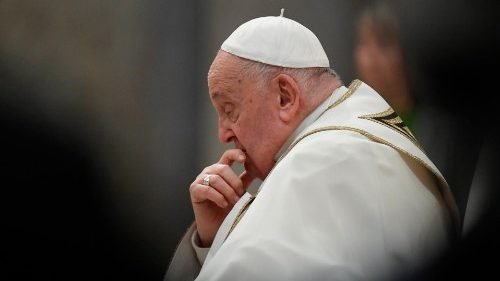By Vatican News
“There was the Oslo agreement—so clear—with the solution of the two states. Until that agreement is applied, true peace remains distant.”
This is Pope Francis’ judgment on events in the Holy Land, following the attacks by Hamas and the war that is destroying the cities of the Gaza Strip.
The Pope shared his thoughts with Domenico Agasso, a Vatican-focused journalist for the Italian newspaper, La Stampa, published on Monday.
Speaking of the many ongoing conflicts, Pope Francis invites everyone to pray for peace, expressing his belief that dialogue is the only path toward a peaceful future.
He called for all parties to “immediately stop the bombs and missiles and end hostile attitudes. Everywhere.” The Pope called for a “global ceasefire,” because “we are on the brink of the abyss.”
Hopes for the Holy Land and Ukraine
The Pope explained his opposition to defining any war as “just,” preferring to say it is legitimate to defend oneself but said it is necessary to avoid “justifying wars, which are always wrong.”
He expressed his fear of a military escalation across the Middle East, but said he entertains some hope “because confidential meetings are taking place to try to reach an agreement. A truce would already be a good result.”
Pope Francis defined Cardinal Pierbattista Pizzaballa, the Latin Patriarch of Jerusalem, as “a crucial figure” who “moves well” and tries to mediate.
He said he speaks by video call with the Holy Family Catholic Parish in Gaza every day, adding that the “liberation of Israeli hostages” is a priority.
Regarding Ukraine, the Pope recalled the task entrusted to Cardinal Matteo Zuppi, the president of the Italian Bishops’ Conference.
“The Holy See is trying to mediate an exchange of prisoners and the return of Ukrainian civilians,” said Pope Francis. “In particular, we are working with Mrs. Maria Lvova-Belova, the Russian commissioner for children’s rights, for the repatriation of Ukrainian children forcibly taken to Russia. Some have already returned to their families.”
‘Fiducia supplicans’ seeks to include
In the interview, Pope Francis recalled that “Christ calls everyone from within,” referring to the Declaration Fiducia supplicans that allows for blessings of persons in irregular or same-sex couples.
“The Gospel is to sanctify everyone,” he said. “Of course, there must be goodwill. And it is necessary to give precise instructions on the Christian life (I emphasize that it is not the union that is blessed, but the persons). But we are all sinners: why should we make a list of sinners who can enter the Church and a list of sinners who cannot be in the Church? This is not the Gospel.”
Regarding criticisms of the document, the Pope noted that “those who vehemently protest belong to small ideological groups.”
He described the Church in Africa as “a special case,” since “for them, homosexuality is something ‘ugly’ from a cultural point of view; they do not tolerate it.”
However, he added, “I trust that gradually everyone will be reassured about the spirit of the declaration,” which “aims to include, not divide. It invites us to welcome and then entrust people, and to trust in God.”
Pope Francis admitted to sometimes feeling alone, “but I still always strive ahead, day after day,” adding that he does not fear schisms.
“In the Church, there have always been small groups that manifest reflections of a schismatic nature. One must let them carry on and pass away… and look ahead.”



